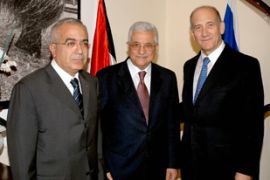Olmert and Abbas seek consensus
But differences remain over statehood ahead of US-sponsored conference.

Published On 11 Sep 2007
Salam Fayyad, whom Abbas appointed prime minister after dismissing the Hamas-led Palestinian government, also attended Monday’s session at Olmert’s residence in Jerusalem, officials said.
Differences
Israeli and Palestinian officials said the talks were aimed at laying the groundwork the planned visit of Condoleezza Rice, the US secretary of state, next week.
However it is unclear how any agreements reached between the leaders can be put in place so long as the Palestinian territories remain divided.
Doubts also remain on how productive the talks have truly been as both sides have different views on what type of document they will be able to draw up before the international conference in November that has been called for by George Bush, the US President.
Olmert is seeking a broad “declaration of principles” while Abbas wants a more explicit “framework” agreement with a timeline for implementation on the core issues of borders, Jerusalem and the fate of Palestinian refugees.
One senior official told AFP on condition of anonymity before the meeting that Olmert refuses to agree to two key Palestinian demands – the release of prisoners before the Muslim holy month of Ramadan and the removal of more than 500 roadblocks in the West Bank.
Abbas has lobbied for these measures in previous meetings and are seen as key issues.
‘Hopeful’
The prisoner release would take place at a later date, the official said.
Washington is pushing Israel to make tangible progress to avoid disappointment at the conference, which Western diplomats said could culminate with the relaunching of long-stalled peace talks.
“I am hopeful,” Abbas told Italy’s RAI television on the eve of his meeting with Olmert.
“But I don’t know what the obstacles are – and we have many of the obstacles – which will face us.
We hope that we can overcome all kinds of obstacles.”
The US has not yet stated publicly what it hopes exactly to achieve at the November conference and has not sent out invitations, but it wants Arab states such as Saudi Arabia, which does not have relations with Israel, to attend.
“[President] Bush has not called for a photo-op meeting,” one senior Western diplomat familiar with the discussions, said.
“There will be an important announcement regarding final status at the conference.”
The Palestinians want a final deal that leads to a fully sovereign Palestinian state in the West Bank, including Arab East Jerusalem, and the Gaza Strip, lands Israel occupied in 1967.
Source: News Agencies